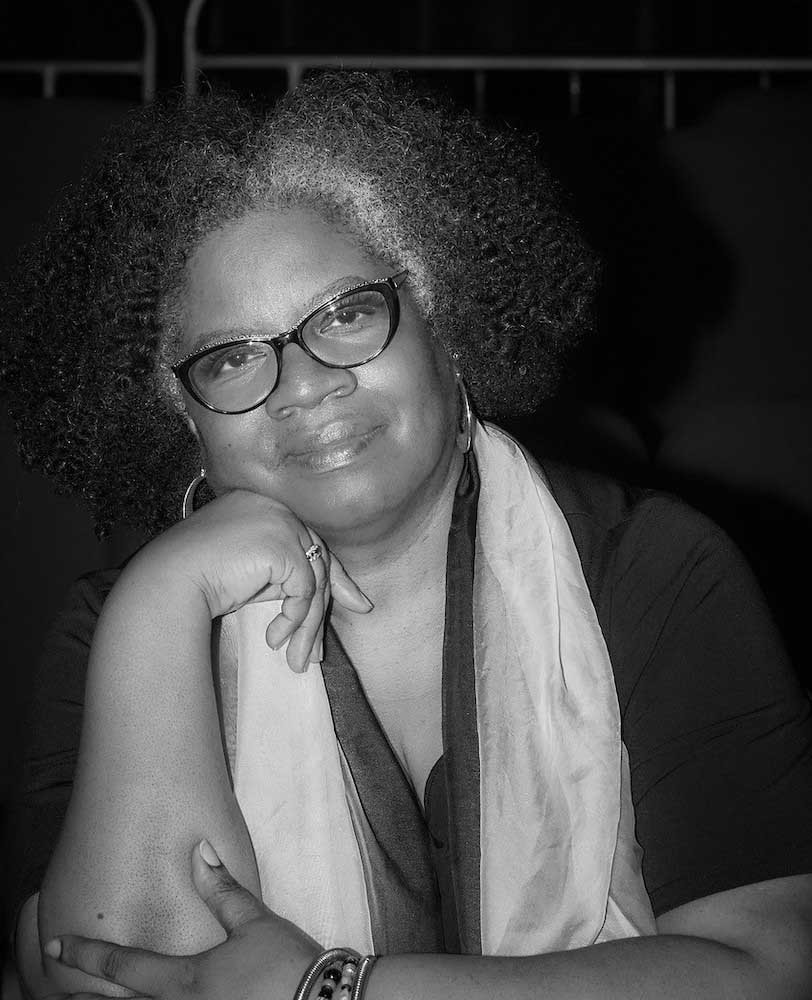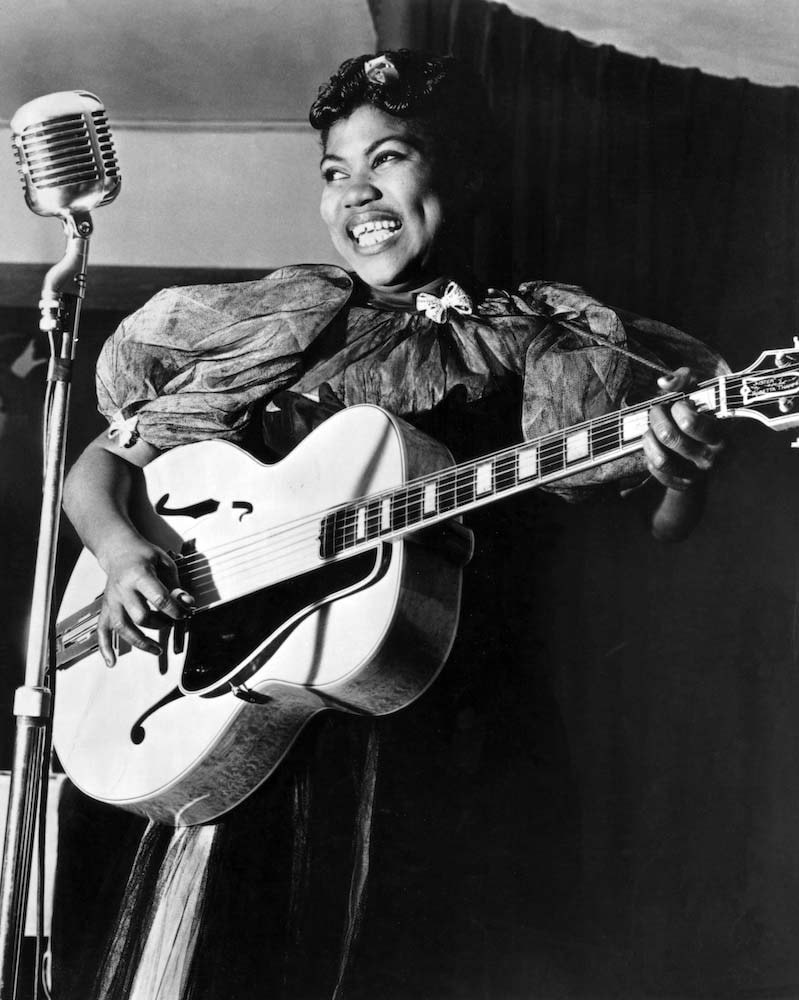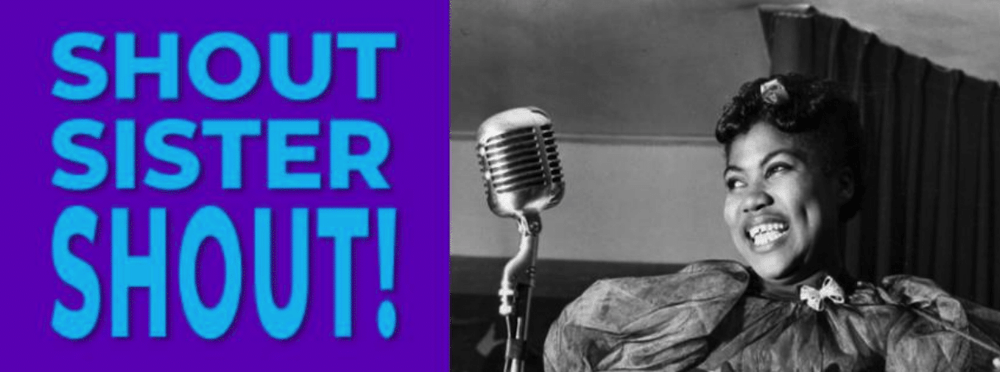How could a charismatic, guitar-playing, innovative vocal stylist known as the “Godmother of Rock ’n’ Roll,” who sold out stadiums in her day, die in relative obscurity while the rock stars she influenced, including Little Richard, Elvis Presley, Johnny Cash, Chuck Berry, and Jerry Lee Lewis, reached superstardom?
Playwright Cheryl L. West explores the life and legacy of Rosetta Tharpe in her new musical Shout Sister Shout!, which was primed for Broadway before the pandemic hit. But like Rosetta Tharpe herself, West isn’t about to let anything, including a global pandemic, keep her down long. Shout premiered at the Pasadena Playhouse in 2017 and underwent restructuring before opening to stellar reviews at Seattle Rep last November. The producers, the Ragovoy Entertainment Group, plan to further develop the show with a regional theater and then ultimately mount a Broadway run.

West already has decades of experience progressing her plays through tumultuous times, so she has the resilience to keep her eyes on the prize and keep trucking. Talking to West about the show revealed how much she vibes off of the strength and vitality of a woman who exceeded beyond expectations and kept pushing to new heights of popularity despite the cultural stigmas that tried to knock her down at every turn.
West indicated that the musical’s source material—Shout, Sister, Shout! by Gayle F. Wald (a GW professor)—is a treasure trove of valuable information about Rosetta Tharpe, but she wanted to dig into the heart and soul of this talented performer, and with the limited live interviews available it was hard to get a sense of Rosetta as a person, to find out how she persevered and got through her challenges.
That’s when West dug into her own Southern-rooted history to help her listen between the lines and get to the core of a sister at the crossroads. Because that’s West’s strong suit: exploring the inner lives of strong women who just won’t take no for an answer. Her most recent effort, enjoyed by D.C. audiences last year, was Fannie Lou Hamer, Speak On It!, presented outdoors at Arena Stage. I asked if she saw similarities between these two icons as she explored their inner journeys.
West: Yes, definitely. Fannie Lou Hamer used to repeat a prayer to herself every day before walking out the door, about “putting on the armor of God.” It gave her a sense of knowing she was protected, knowing she was God’s child. It kept her feet planted solidly, knowing she would be tested, but also having faith that she’d get through, no matter the treachery. Faith has a way of staying at your back so you can stay upright.
For Rosetta Tharpe, my mission was to fill in the gaps to figure out: Who was this woman? What kind of strength did she have to persevere in the time of such blatant racism, misogyny, cultural ignorance? What did she really want?

Debbie: What kind of woman was Rosetta to get through all that?
She had enormous bravery and strength to do what she did. She had her insecurities about her lack of education, but she compensated for that with her music, her art. She seemed to have her own blueprint, a roadmap for who she wanted to be at that time. She also had this unwavering faith in God, and in her music. Rooted in gospel and spiritual traditions, she was one of the first to bring that style to popular music on a massive scale. For that, she was seen as turning her back on Christian music and faith and was shunned by her church family, her treasured roots who loved and nurtured her. That affected her deeply but that didn’t stop her. I saw a lot of that kind of old-time strength in my own family.
You get a jaunty lightness in your voice when you talk about listening to the stories of your great-grandparents. I get a sense that you were an “old soul.” How did listening to their stories affect you as a little girl?
(Laughing) Visiting my family as a little girl on trips South to Mississippi, my favorite place was sitting underfoot listening to my great-grandparents talk about their lives, joys, and struggles. I realized early on that we need those kind of stories, how to get back up when we get knocked down. Later on as a playwright I used those same listening skills to observe the contradictions between what people said and what they did, and I was always trying to reconcile that dissonance. That’s what writers do.
Sounds like you really got into the heart and soul of Rosetta. What would you like to relate about her?
The more I researched and learned about her accomplishments, I felt this overwhelming joy in the story, the music, the struggle and in Rosetta. She was a very charismatic woman—liked to tease, flirt. Learning about her tough journey, I started thinking if she can go through that and come out on top and still have a smile on her face, okay, let me get out the door today. And that’s the beauty of theater because in that moment, we’re all connected together and having a live experience.
Tell us about your design team. What’s it like to see your words fly across the stage in movement and dance sequences?
Well, we’ve got orchestration by Joseph Joubert, a talented musician known for his fabulous work on The Color Purple and Respect. Award-winning Kenneth L. Roberson is the director, who I anticipate will contribute a fluid movement aesthetic regarding staging. Emilio Sosa, the costume designer, researched the period to render exactly what we needed. The entire artistic team and staff is still working tirelessly together to keep improving the show.
Everyone working together—wow! We’ve been so separated in our own little bubbles it almost sounds otherworldly. What’s the rehearsal process been like in our isolated conditions?
You’re right, it’s been quite an adjustment, rehearsing my Fannie Lou Hamer piece. Even with all the safety protocols and precautious in place, admittedly, there’s still some social anxiety about being with people, with each other! But there’s also tremendous excitement. We need stories right now, because it’s stories that’s going to connect us again as human beings. The significance of live experience cannot be overstated—the group gathering, being in the same place and space, experiencing community and story together.
For an audience to come out and see your work in an outside venue says a lot! You are obviously a beloved favorite here in D.C. I think I’ve seen almost everything you’ve done here.
I’ll always be grateful for D.C. audiences who attend from all parts of the “DMV” as we’re referring to the metro region now. Artistic directors can like you or your work, but you need paying folks to show up! I’ve seen how audience members attend the shows with enthusiasm; they hear the language, and they appreciate it’s about them, the realm of their life experiences. I’d like to think that my work reflects a spectrum of the human experience, particularly the Black experience, the beauty of our worlds and perspectives, the joy, sweetness, complexity, and complications.
You mention how Rosetta broke down barriers. And she took some heat for that. You had your share of barrier-busting, too.
Oh yes, I sure did. I had my first professional production here back in the early ’90s, Before It Hits Home at Arena Stage, about AIDS and a Black family. The show was attacked for the language, content—even acknowledging AIDS in the community was a huge step at that time.
It was almost before its time. But it has withstood all these years.
Definitely. True Colors [Theatre Company] just did a 30th-anniversary celebration reading. That’s what we have to do as artists—we reflect what’s going on in the world, look at it differently, infuse it with humanity. We are a complicated beautiful people—we have so many stories to tell, and we have to be committed to telling those stories.
What did you learn about Rosetta Tharpe in the rehearsal process?
I saw and felt how her words resonate—she was just full of joy. She talked to God through her music, and God talked to her and through her. I learned that sometimes the only way to reach somebody is through music. She was self-taught, naturally talented, played piano and guitar, and wrote songs. To her, music was love.
I also saw how actors inform the work, sometimes they’ll teach you what you intended as a writer. They breathe life into the characters and facilitate insights the writer may have been unaware of at the time. You work on a piece for years, then come in the room and great actors inhabit those roles, you get a chance to sit back and you learn something. That’s what’s exciting about rehearsal. The actors, musicians, and design team help tell the story. There’s nothing like a collective experience to feel our humanity.
For information and updates about the show, see SHOUT SISTER SHOUT!





